- Home
- Upton Sinclair
Dragon Harvest Page 32
Dragon Harvest Read online
Page 32
Here at the fountainhead of this poison, it was a P.A.’s duty to listen, and agree with everything and make mental notes to be put into a report. He knew that Quadratt had come on business, so he sat without interrupting while the other told of various books he had written under pen names and had published through his camouflaged press in New Jersey, and of new sources of information and propaganda devised by the tireless Dr. Goebbels in Berlin. Quadratt had brought along a brief case full of documents and clippings, with passages especially marked for the editor-priest. Some of this interested the latter so much that he invited Quadratt to make them into articles—on the usual terms, as he quietly mentioned.
Lanny made careful note of every word, for a trap had been set for bears, and it might be that right at this moment one of the biggest grizzlies was putting his foot into it. Some two years ago Lanny Budd had suggested to F.D. that there might be a law requiring agents of foreign governments to register their activities with the State Department; that law had been passed, and it had a lot of sharp teeth. Forrest Quadratt had registered himself, so the newspapers reported; but had he included all the different kinds of services for which he was being paid? If he had overlooked any one of them, Lanny’s report might go to the Department of Justice with the suggestion that they take up the matter at once.
XI
They spent the rest of that day traveling about Detroit and its environs, meeting various promoters of the Nazi-Fascist cause. Lanny made careful note of names and activities—especially those at the Bund Camp which flourished near the city. If any of those persons paid money to Quadratt, that would be a sharp tooth in the bear trap. Roosevelt had told Lanny that he had agents keeping contact with these plotters, but he had added that sometimes a hint from a high-up insider might save a lot of wasted effort. Lanny knew that he had such an insider in his car right now.
After dinner they drove to Maccabee’s Auditorium, and took seats amid a rapidly growing throng. Leading personalities sat upon the platform, and Quadratt asked if his friend would care to join them; but Lanny apologized, saying: “I have to keep to my role as art expert, and not take part in politics. You were once an ivory-tower dweller, so you will understand.”
The other smiled and assented. “One learns more, anyway, by sitting among the crowd and watching them closely.”
Lanny studied the faces of the men and women pouring into this hall. There seemed to be an unusual proportion of the elderly: people who obviously had worked hard all their lives, and had saved at least enough to have a suit of decent clothing, or a dress, in which to attend inspirational meetings like the present. Lanny noted their serious, deeply lined faces, and tried to imagine their lives; for this was the land of his forefathers, which he didn’t know so very well. The settlers of this district had come straight from New England, grandchildren of the stern old Puritans, driving “Conestoga wagons,” the Fords of that day. There had been hell-fire preachers among them, and fanatical abolitionists, whose sons had formed armies to win the Civil War.
There weren’t many labor-union men in this crowd, Lanny guessed; if there were Ford workers, they were the “hillbillies” whom Henry had been bringing in by the thousands because they didn’t know anything about unions and couldn’t read subversive literature. Most of the audience were shopkeepers and small farmers, many of whom had sold their family farms and moved near to a town where they could get medical treatment and attend the movies and meetings; some raised chickens and rabbits, and others sat by the stove and complained of the pains in their joints.
They were serious-minded folk, and knew that there was something terribly wrong with their country; when they wanted to find out about it, the most likely guide was a preacher—their own kind, a shouting evangelist of the old-time religion. “It was good for my fathers and it’s good enough for me!” Tonight they had come to hear the Reverend Gerald L. K. Smith, a handsome, burly Louisianan with waving dark hair and a winning smile when he saw fit to use it. He had joined up first with Pelley, the man who boasted of having spent seven minutes in eternity, and who had founded the Silver Shirts, perhaps on instructions there received. But Pelley had kept all the money, and Smith had moved back to Louisiana and become the associate of Huey Long, preaching the gospel of “Every Man a King.” When Huey was shot, Smith tried to take his place, and, failing in that, had chosen Detroit as the future headquarters of American Nazi-Fascism.
His movement was called the “Committee of One Million,” perhaps the largest committee ever formed; it needed to be, for its avowed purpose was “to seize the government of the United States.” It was political, but carried on in the manner of religion—a crusade against the devil, a holy war to save America from the stinking Reds and the slimy Jews and the bewhiskered aliens and all the hordes from Europe and Asia and Africa who had sneaked into the land of the Pilgrims’ pride in order to betray it; people who had no faith in Jesus Christ, and didn’t understand the uses of liberty; people ignorant, dirty and degraded, dumb cattle most of them, and the few with brains the hired agents of foreign governments which wanted to drag America into their quarrels, and ultimately to destroy the faith of the Lord Jesus Christ and the country which God had founded to be its refuge and its temple.
XII
Such was the gospel of “Reverend Smith,” as his followers called him. It was the whole Nazi creed of hate, complete to the smallest detail, but translated from German into Middle Western with a touch of the South. It was preaching in the style of the old-time camp-meeting, where people were used to shouting “Amen!” and “Come to Jesus!” and, when they got really going, to rolling in the aisles or “talking in tongues.” When Reverend Smith got warmed up, he bellowed in a voice which put the amplifier out of business; he took off his coat and then he tore open his collar—a ceremonial of seizure by the spirit. Perspiration streamed down his face, and while he mopped it with a handkerchief in one hand he held the other aloft with fist clenched, threatening the enemies of the Lord Jesus Christ. When he finished, his shirt was soaking wet and his hair hanging limp as if he had just come out of a swimming-pool.
Here was one rabblerouser who had not yet forgotten the “poor and lowly,” and was not embarrassed to have an “economic program.” His heart bled for those who lived below the level of security, and he pictured for them a bright and shining Utopia, to be attained the moment the stranglehold of the Jew Deal should have been torn from their throats. Poverty in the modern world was a crime, deliberately inflicted upon the masses by the international bankers, the Jews, the Reds. Ham and eggs, thirty every Thursday, sixty at sixty—these the orator took from California; abolition of the gold standard from Coughlin; abolition of interest slavery and the breaking of monopolies from Hitler of the old Munich days.
The whole performance took Lanny back a matter of fifteen years, to the enormous Bürgerbraukeller where he had listened for the first time to a two-hour tirade of Schicklgruber. When this obscure agitator had first come onto the platform, Lanny had thought he was a caricature of Charlie Chaplin; but listening to him and seeing his effect upon the crowd, the American had realized that this was a social portent. And here in Detroit was the same thing, with few changes and all of them superficial. When Gerald Smith started pulling the tremolo stop, telling the mothers and the grandmothers in this audience how the international Jews were conspiring to drag American boys into their European wars, and picturing the horrors which would befall those boys—when Lanny heard moans and cries throughout the audience and looked about and saw women with pain-distorted faces and tears streaming down their cheeks—he grew sick in his soul; it seemed to him that some devil was engaged in making a caricature of the democratic process, reducing it to a farce, to prove that the people were incapable of thinking and must really have a master to drive them with a whip.
When Lanny came out of the Munich beerhall he had asked: “Is this the German Mussolini?” And now he asked: “Is this the American Hitler?” He asked it respectfully, of course, and
with no signs of disgust. “It seems to me he has everything it takes; he understands the American masses.”
“I agree with you,” said Forrest Quadratt. “I am backing him for the role, and you’ll be interested to know that some pretty big outfits are backing him to the limit.”
XIII
Next morning they set out on their return journey, but by another route. Lanny had picture business, and his companion assented with pleasure, for he was always glad to meet rich people—who could say what might come of it? They drove a couple of hundred miles southward, and on the way they talked about the three eminent personalities they had met, and the great city of automobiles and its future. Quadratt was of the opinion that Gerald Smith had made a wise choice, for Detroit was destined to become the center of American social discontent. “Wait until the New Deal has spent the last dollar it can borrow; then you’re going to see hell break loose.”
Lanny agreed. The wholesale importation of labor from the South, and especially of Negroes, was bound to lead to race riots. The Nazi agent rubbed his soft moist hands together and murmured: “The American people will really have to listen to us, Budd!”
They came to Cincinnati, a sort of half-southern city on the banks of the Ohio. It was the family home of Sophie Timmons, Baroness de la Tourette, and site of the great hardware plant which had supported this red-headed and high-spirited lady in luxury ever since Lanny Budd could remember. Some of Sophie’s relatives had come to visit her now and then, and Lanny knew them and had promised to call and talk about paintings. He had a portfolio of photographs to show and a list of prices to quote, and this took an evening; his Nazi friend sat by and thought that it was a high-class racket, but lacked the extraordinary future of his own. The ex-poet had seen things happen in Berlin and Vienna and Prague which made him a little dizzy. He saw himself becoming Gauleiter of the New York district, or even of the North Atlantic States.
XIV
Then to the east; all highways were equally good—you could hardly tell them apart. Their route took them through the Alleghenies, and it was April in the valleys, and March when they climbed, and then April again when they descended. On the way Lanny became confidential and told about the large sums he was collecting from the rich; and Quadratt was moved to emulation—his fees were not so large but were more regular. The Münchner Neueste Nachrichten was paying him five hundred a month as their American correspondent, and the German Library of Information in New York paid him the same as their adviser; recently they had paid him twelve hundred dollars extra as a fee for a specific “consultation.” Last year, during a trip to Germany, he had collected even larger sums; for the heads of the Nazi machine understood that their collaborators had to live well and be in a position to entertain those whom they wished to enlist. “They are pouring out money,” said the registered agent, “and why shouldn’t I get mine?” Lanny had no reason to suggest.
They were passing through the coal districts in the mountains of West Virginia; the roads were lined with unpainted two-story shacks, built in rows of a dozen or more, sometimes all one building. Everything was smeared with coal dust, including the faces of the ragged children who stood in front of the houses, staring as the car swept by. “Mining districts are the same all over the world,” remarked the ex-poet. “Imagine the idea that such people are supposed to help in ruling the state?”
The art expert replied: “Over here it is ruled by political bosses in a smoke-filled room.”
This had been a delightful journey, and a close friendship had grown out of it. They took to calling each other by their first names, and presently Lanny referred to his little daughter in England; this caused his companion to ask about that celebrated marriage which the grandson of Budd Gunmakers had contracted. What had caused it to go on the rocks? Lanny replied that a man who loved music and art and books couldn’t be happy with a woman who had to spend one or two million dollars every year and was concerned to make a public ceremonial of it. “Irma is in exactly the right place as the wife of an English earl,” he said; and the other remarked: “I thought her an admirable woman, but a little lacking in a sense of humor.”
He was moved to reveal in turn the sorrow of his personal life. “My wife is a gentle and lovely woman, but unfortunately she is part Jewish. In the beginning I thought that wouldn’t make any difference, but as the years passed I discovered that the worst racial traits have a way of coming to the front with advancing age. You can understand what that means to one in my position in these times.”
“I can indeed,” replied Lanny, sympathetically.
“It has resulted in my two sons becoming estranged from me, and indeed going over to the enemy.”
There was a tremor in the man’s voice which betrayed the feeling he wished to deny to himself as well as to others; and Lanny felt a touch of pity for this perverted soul. “I can sympathize with you, Forrest. I too have Jewish relatives, and have had to avoid them for the same reasons. We have to remind ourselves that, we are serving a cause, and that all humanity is more important than some individuals who happen to share our blood.”
“Quite so! I have learned to put these personal troubles out of my mind. I have found that there are many charming women in New York, and some of them are always ready to provide me with entertainment. You have observed that same fact, no doubt.”
“I have observed it in different parts of the world.”
“The only trouble is they take it so damned seriously! I sometimes think the greatest service we Nazis have rendered to the German people is in teaching the Mädchen to take love-making as a matter of course.”
“It certainly saves a lot of bother,” remarked the much-traveled art expert. “But I wonder how you are going to patch up that problem with the Catholics.”
“Oh, pouff!” exclaimed the author of Eros Unbound, with a sudden gesture of the hand. “We will blow them out of our way in the first week when we take power!”
12
T’Other Dear Charmer Away
I
Depositing his traveling companion at the door of his Riverside Drive apartment, Lanny was so sick of Nazis and the thought of Nazis that he went to the opposite extreme, driving to the home of his half-sister Bess and her Jewish husband, Hansi Robin. They loved and trusted him, and when he said: “I am getting information about the Nazis and making important use of it,” they forgave him for never going out in public with two well-known Communists. When Hansi gave a violin recital Lanny did not enter the hall with them, but bought his ticket like any other member of the audience. However, he would come to their home on the Connecticut shore and have a feast of music, and pour out his heart on the subject of the tragedy which he saw hanging over the old continent overseas.
But don’t ever try to decide what was to be done about it, because then they would get into an argument! Was dictatorship necessary, as a transition stage to a collective world, or was it possible for democratic countries such as the Anglo-Saxon and the Scandinavian to socialize industry by popular consent? Marx had said that it might be possible, but very few Marxists knew that he had said it. Lenin had said that it wasn’t possible, and all Communists took him for their bible, and were outraged by the suggestion that extremes meet, and that the Communist tactics had helped the Nazis to power in Germany, and that the tendency of dictatorships is to perpetuate themselves and to recognize their kinship with other dictatorships.
Oh, heresy, oh, double distillation of schism! Anathema maranatha! Lanny informed his relatives that Hitler at this time was persistently seeking some understanding with the Soviet Union which would leave him a free hand to deal with Western Europe. Lanny declared that there appeared to be a chance of this effort’s succeeding, and the remark almost brought tears to the eyes of the two musicians. So Lanny would end such discussions by going to the piano and pounding out a Chopin polonaise.
This was a happily married couple, something not so common among modern intellectuals, plagued by a variety of novel theories. Th
is pair had their religion—it was that, even though to use the word was to insult them. They had their art, which reached into infinity, and in which perfection was to be sought but never attained. They could earn all the money they wanted; they would do so, and then give so much to their cause that they would have to plan another concert tour. They had two lovely babies, and this was a responsibility, and a reason for their four parents to keep urging them to save something.
The two Jewish parents lived near by, and this was another home for Lanny Budd, any time he chose to visit there. Johannes Robin, onetime Schieber millionaire, was doing well enough as salesmanager of Budd-Erling, and had taught himself moderation in his desires. His good kind wife, whom they all called Mama, was as happy as any old woman could be who had known so much tragedy and fear. It was a wicked world, wholly beyond her understanding, and all she asked was a quiet corner to hide in with her loved ones. The fact that they were not invited to become members of the local country club—ach, du lieber Gott, what did that matter to a woman whose husband had been spat upon in the old red-brick police prison on the Alexanderplatz in Berlin, and whose darling younger son had been tortured to death in Dachau concentration camp? Wenn wir nur unsere Ruhe haben!
Truth to be told, Mama had never been happy in Germany. Making so much money, living such an expensive life, it was beyond all reason and could not but lead to trouble. All those proud rich people who came to see them had no real friendship in their hearts, and were bound to look down upon Jews and to envy them for too great success. Mama had never enjoyed their society, for she knew that she didn’t look like them, and if dressmakers fixed her up it didn’t become her, and what was she ever to do with her Yiddische accent? Now we have escaped, all of us but poor darling Freddi, and Rahel’s poor brother Aaron; now, um Gottes Willen, let us live simply and not make ourselves conspicuous, and don’t expect a poor dumpy Jewish grandmother with curly gray hair to dress up as if she were a queen in der hohen Welt. Let us send our little ones to the public school and have them learn to talk and to look as much like Americans as possible, so that nobody will hate them and nobody will want to beat them with clubs or cut them with knives or throw them into dungeons to rot and die!

 Prince Hagen
Prince Hagen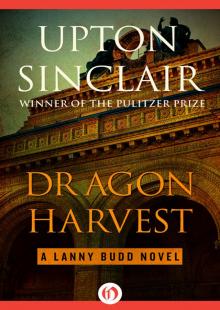 Dragon Harvest
Dragon Harvest The Jungle
The Jungle Sylvia's Marriage
Sylvia's Marriage Oil! A Novel by Upton Sinclair
Oil! A Novel by Upton Sinclair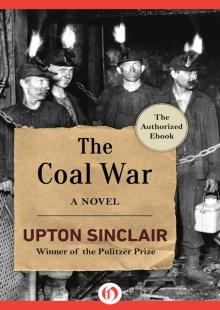 The Coal War: A Novel
The Coal War: A Novel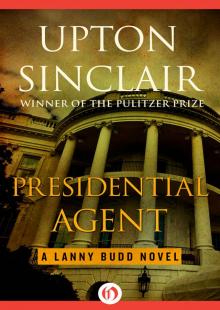 Presidential Agent
Presidential Agent World's End
World's End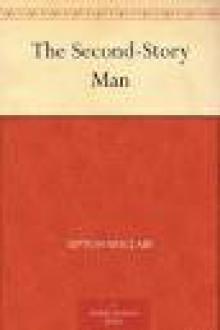 The Second-Story Man
The Second-Story Man O Shepherd, Speak!
O Shepherd, Speak! Wide Is the Gate
Wide Is the Gate The Return of Lanny Budd
The Return of Lanny Budd One Clear Call I
One Clear Call I 100%: the Story of a Patriot
100%: the Story of a Patriot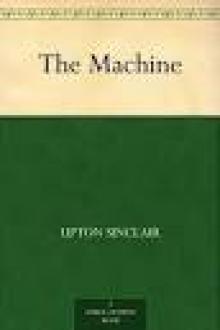 The Machine
The Machine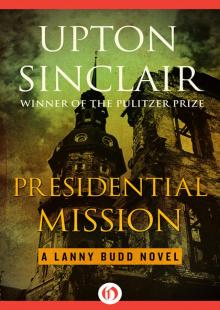 Presidential Mission
Presidential Mission A Cadet's Honor: Mark Mallory's Heroism
A Cadet's Honor: Mark Mallory's Heroism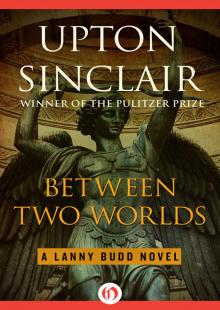 Between Two Worlds
Between Two Worlds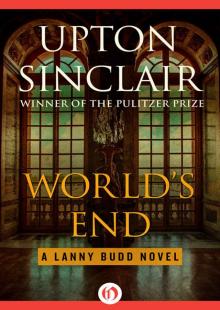 World's End (The Lanny Budd Novels)
World's End (The Lanny Budd Novels)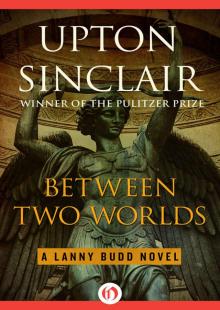 Between Two Worlds (The Lanny Budd Novels)
Between Two Worlds (The Lanny Budd Novels)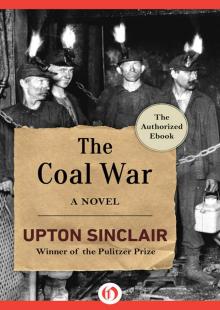 The Coal War
The Coal War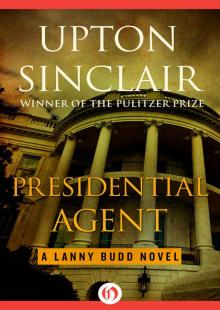 Presidential Agent (The Lanny Budd Novels)
Presidential Agent (The Lanny Budd Novels) Oil (filmed as There Will Be Blood)
Oil (filmed as There Will Be Blood) Wide Is the Gate (The Lanny Budd Novels)
Wide Is the Gate (The Lanny Budd Novels)